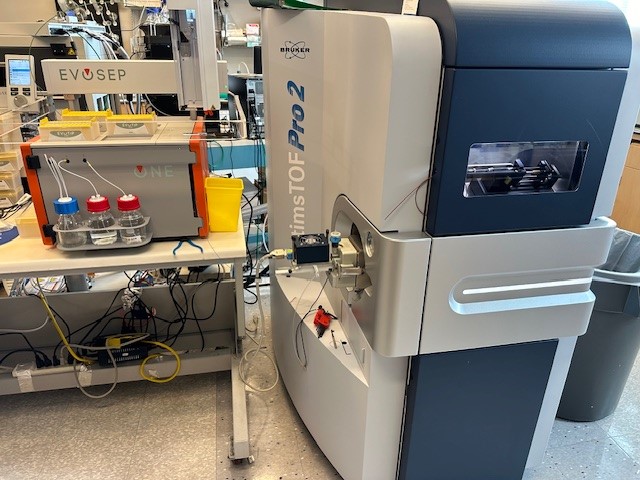Supported By
The facility is supported by the NIH shared instrumentation grant numbers
S10 OD016234 (Synapt-HDX-MS) and S10 OD021724 (LUMOS Orbi-Trap).
Please reference these grant numbers for publications resulting from data obtained from these instrumentations.
Funds from Moores Cancer Center of UC San Diego
News
New Instrumentation
1) "Bruker Single Cell proteomics mass spectrometer: SCP TIMS-TOF ULTRA 2" coupled with hight throughput UPLC Evosep One, One the most sensitive and advanced mass spectrometers for sample limited experiments"
2) TIMS-TOF HT now with increased loading capabilities versus the previous setup.
Facility Personnel
 |
Director, BPMSF FacilityMajid Ghassemian |
 |
Faculty OversightElizabeth Komives |
Director, HDX FacilityHas spent over 20 years studying gene expression and protein biochemistry, primarily in reference to cancer, angiogenesis and the immune system. |
|
Services
- DIA-PASEF protein quantification.
- Global Phosphorylation Analysis "Phospho-proteome".
- Global "BioID" for the identification of in vivo protein-protein interactions.
TMT10 TMT16 TMT18 pricing
| TMT service | TMT10 | TMT16 | TMT18 |
| University of California (UC) users | $4,000 | $5,000 | $5,300 |
| Non-UC (other academic or private sector) | $5,800 | $7,250 | $7,685 |
Each TMT service will include sample digestion (from cell pellet or lysate or homogenized tissue) and peptide purification for 10, 16 or 18 samples depending on the TMT service. Once each sample is TMT labelled they are pooled and fractionated using high pH reverse phase fractionation kit (Thermo) into 8 unique fractions. Each fraction is then analyzed using 120 min LC-MS2 on LUMOS Orbitrap FAIMS mass spectrometer. The data from 8 fractions will be searched as a pool using Peaks software for protein quantification analysis.
Recent Publications
- A phage nucleus-associated RNA-binding protein is required for jumbo phage infection
- Identification of the bacteriophage nucleus protein interaction network
- Cancer-cell-secreted miR-122 suppresses O-GlcNAcylation to promote skeletal muscle proteolysis
- Ncor2/PPARα-Dependent Upregulation of MCUb in the Type 2 Diabetic Heart Impacts Cardiac Metabolic Flexibility and Function
CHM283\BENG283\BIOM208
A graduate course, with both laboratory and lecture series, to train students in the theories and practical applications of protein mass spectrometry. Course is offered in the spring of 2025.
Supported By
The facility is supported by the NIH shared instrumentation grant numbers
S10 OD016234 (Synapt-HDX-MS) and S10 OD021724 (LUMOS Orbi-Trap).
Please reference these grant numbers for publications resulting from data obtained from these instrumentations.
Funds from Moores Cancer Center of UC San Diego
